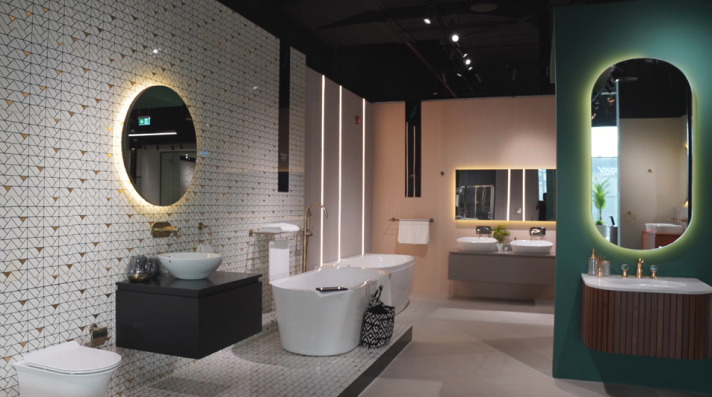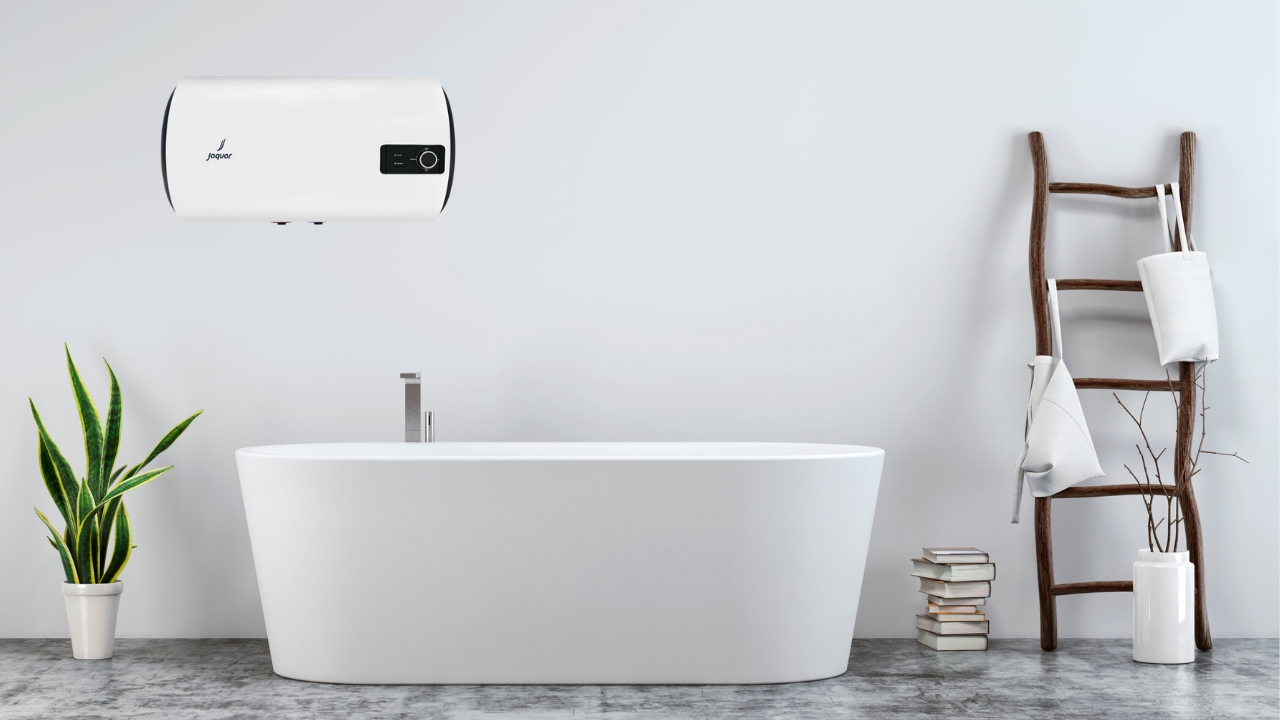In this age of sustainability and energy, it is crucial to pick the right water heater for your home, which can make a huge difference. Energy-efficient water heaters not only reduce your energy bills intelligently but also contribute massively to environmental conservation. This comprehensive guide will take you through everything about energy-efficient water heaters including the various types available, the benefits they offer as well as how to choose the right one for you.
Understanding Energy-Efficient Water Heaters
Energy-efficient water heaters are designed to cut down on energy usage while still producing efficient results. Unlike other traditional models that may waste energy through heat loss or inefficient heating methods, they utilize advanced technology in order to optimize its use in such applications.
Types of Energy-Efficient Water Heaters

Credits: Jaquar
Tankless Water Heaters
Tankless water heater systems, also referred to as on-demand water heaters only produce hot water when required. The tankless models do not store any hot water unlike old conventional storage-type units that continuously heat and store it. Standby heat loss from traditional tank heaters is eliminated using this method.
Advantages:
- Energy Savings: By heating water only when required, tankless heaters reduce overall energy consumption.
- Compact Design: Their small size allows for installation in tighter spaces, freeing up room for other uses.
- Continuous Hot Water: Ideal for households with high hot water demand, as they provide a continuous supply without running out.
Disadvantages:
- Higher Initial Cost: The upfront cost is typically higher compared to traditional tank models.
- Flow Rate Limitations: They may struggle to provide hot water to multiple outlets simultaneously, particularly in larger homes.
Heat Pump Water Heaters
To warm up the water, heat pumps use electricity to move warmth from air or ground. Instead of creating new one like normal electric ones do these devices transfer the existing warmth which makes them much more efficient.
Advantages:
- High Efficiency: Can be two to three times more efficient than conventional water heaters, leading to substantial energy savings.
- Lower Operating Costs: Over time, the reduced energy consumption translates into lower utility bills.
Disadvantages:
- Installation Requirements: Requires sufficient space and appropriate conditions for optimal performance.
- Reduced Performance in Cold Weather: Efficiency can decrease in colder climates, impacting their effectiveness.
Solar Water Heaters
This is where solar energy gets harnessed by solar panels mounted on your roof or any other sunny location. Solar power aids these systems in heating water which makes them eco-friendly and renewable sources of heating water.
Advantages:
- Sustainable Energy Source: Reduces reliance on fossil fuels and decreases your carbon footprint.
- Low Operating Costs: Once installed, the cost of operation is minimal, as solar energy is free.
Disadvantages:
- High Initial Cost: Solar water heaters require a significant upfront investment for solar panels and installation.
- Dependence on Weather: Effectiveness depends on sunlight availability; performance can be lower on cloudy or rainy days.
Condensing Water Heaters
These heaters convert waste flue gases into useful heat. This capturing of heat improves the overall efficiency leading to reduced amounts of energy consumed by the device itself.
Advantages:
- Enhanced Efficiency: Utilizes waste heat to boost performance, making it more efficient than non-condensing models.
- Reduced Energy Bills: Lower operating costs due to improved efficiency.
Disadvantages:
- Higher Cost: Generally more expensive than conventional models due to advanced technology.
- Special Installation Needs: Requires a specific venting system to handle the condensing process.
How to Choose an Energy-Efficient Water Heater

Credits: Jaquar
To ensure that your household’s hot water needs are met and it has long-term benefits, there are several key factors to consider when selecting the right water heater. Here is a step-by-step approach to help you make an informed choice:
1. Assess Your Hot Water Needs
The type of water heater required can be determined by how much hot water a household needs. Sizes of families, number of bathrooms and daily hot water usage should be taken into account.
- Small Households: For smaller families or homes with lower hot water usage, a tankless or small-capacity water heater may be sufficient.
- Larger Households: Larger families or homes with higher hot water demands may benefit from a larger tankless system or a heat pump water heater.
2. Consider the Energy Source
When choosing your home’s energy source for heating the water, buy a related kind of water heater. These sources may include:
- Electric Water Heaters: Ideal for homes without natural gas connections. Modern electric models can be highly efficient, especially if they have advanced features.
- Gas Water Heaters: Generally more cost-effective if natural gas is available, with a faster heating time compared to electric models.
- Solar Water Heaters: Perfect for homes with ample sunlight and a higher initial budget.
3. Check Efficiency Ratings

Credits: Jaquar
Focus on those that have high energy factor (EF) ratings as well as ENERGY STAR certifications when picking one out. Such rating show that these kinds of heaters are most effective in saving energy thus reducing costs paid in bills.
- Energy Factor (EF): A higher EF rating means better efficiency. For tankless water heaters, look for an EF rating of at least 0.82. For heat pump models, an EF rating of 2.0 or higher is ideal.
- ENERGY STAR Certification: Products bearing this certification have passed rigorous efficiency tests and offer superior performance.
4. Evaluate Installation Requirements
Consider the space available for installation and any specific requirements for the chosen water heater type.
- Tankless and Heat Pump Models: May require additional space for installation and proper ventilation.
- Solar Water Heaters: Need ample roof space for solar panels and may involve complex installation.
5. Budget and Cost Considerations
Consider the initial cost versus long-term savings potential. Although energy-efficient models can come with higher prices, they save significantly on energy costs over time.
- Initial Costs: Factor in the cost of purchasing and installing the water heater.
- Operational Costs: Consider the potential savings on utility bills due to improved efficiency.
Features to Look For in Energy-Efficient Water Heaters

Credits: Jaquar
When selecting an energy-efficient water heater, consider the following features to maximize performance and savings:
1. Advanced Thermostats
Current water heaters have these advanced thermostats that allow you to precisely set your desired temperature. This is important because it helps you maintain the temperature you want your water to be at while using less power hence being more energy efficient.
- Digital Controls: Offer easy-to-use interfaces for setting and adjusting temperatures.
- Programmable Settings: This allows you to schedule heating times to match your usage patterns.
2. Insulation Quality
High-quality insulation around your tank or pipes minimizes loss of heat thus ensuring efficiency is maintained while reducing the energy required to keep water hot.
- Thick Insulation: Reduces standby heat loss, especially important for tank-style heaters.
- Insulated Pipes: Helps maintain water temperature as it travels from the heater to the faucet.
3. Variable Heating Modes
Some models come with several options for adjusting the heater output to meet your specific requirements. This flexibility can lead to additional energy savings.
- Eco Mode: Reduces energy consumption by lowering the heating temperature.
- Boost Mode: Increases heating power for faster hot water delivery.
4. Automatic Shut-Off
Automatic shut-off features ensure that when not in use, the water heater automatically turns off, thus reducing wear and tear and avoiding unnecessary consumption of energy.
- Safety Mechanisms: Prevents overheating and potential damage to the unit.
- Energy-Saving Features: Automatically adjusts operation based on usage patterns.
Benefits of Energy-Efficient Water Heaters

Credits: Jaquar
1. Cost Savings
Energy-efficient water heaters lower your utility bills by using less energy to heat water. Over time, these savings can offset the initial investment in a more advanced model.
- Reduced Energy Bills: Energy-efficient models use up to 50% less energy than traditional models.
- Long-Term Savings: The savings on utility bills can add up significantly over the lifespan of the heater.
2. Environmental Impact
By reducing energy consumption, energy-efficient water heaters help lower greenhouse gas emissions and decrease your overall carbon footprint.
- Lower Carbon Footprint: Reduces reliance on fossil fuels and decreases greenhouse gas emissions.
- Sustainable Choice: Contributes to a more sustainable and environmentally friendly home.
3. Enhanced Performance
Modern energy-efficient models often offer improved performance features, such as faster heating times and better temperature control, enhancing your overall comfort.
- Faster Heating: Provides hot water more quickly than traditional models.
- Consistent Temperature: Maintains a steady water temperature, improving comfort and convenience.
Maintenance Tips for Energy-Efficient Water Heaters

Credits: Canva
To ensure your energy-efficient water heater continues to perform optimally, follow these maintenance tips:
1. Regular Inspections
Schedule regular inspections to ensure your water heater is operating efficiently. Professional maintenance can identify potential issues before they become major problems.
- Annual Checkups: Have a professional technician inspect and service your water heater once a year.
- Performance Monitoring: Regularly check for any changes in performance or efficiency.
2. Flushing the Tank
For tank-style heaters, periodically flush the tank to remove sediment buildup. This helps maintain efficiency and prolongs the life of the heater.
- Sediment Removal: Flushing the tank removes sediment that can affect heating performance.
- Maintenance Schedule: Flush the tank at least once a year or more frequently if you have hard water.
3. Check Insulation
Ensure that the insulation around your tank and pipes is intact. Proper insulation helps maintain water temperature and reduces energy loss.
- Inspect Insulation: Regularly check for any damage or wear in the insulation.
- Replace as Needed: Replace or repair insulation if it becomes damaged or ineffective.
4. Monitor Performance
Keep an eye on your water heater’s performance and address any unusual noises or changes in water temperature promptly.
- Check for Issues: Listen for unusual noises or changes in water temperature that could indicate a problem.
- Address Problems Early: Address any issues as soon as they arise to prevent further damage.
Conclusion
Selecting an energy-saving model for your heating system is a major step towards reducing your power consumption, saving on utility bills and protecting the environment. There is a solution for every home and budget that includes tankless, heat pump, solar and condensing models.
Look into your household’s hot water needs, energy source and efficiency ratings before choosing a water heater. You will not only save money but also make the planet greener by investing in superior quality and energy-efficient water heaters.
Jaquar is known for its range of excellent products that combine performance, durability, and energy saving. Jaquar water heaters are equipped with features like multi-function safety valves, high-density insulation, and dual safety thermostats among others. Elena water geyser is one such product that comes with a cordless remote and full digital display in every unit offering you convenience as well as modernity at its very best.
Seek innovation, reliability and luxury from us while shopping for a good water heating system. To find out which of our eco-friendly geysers suits your home perfectly just call your nearest Jaquar dealer today.


